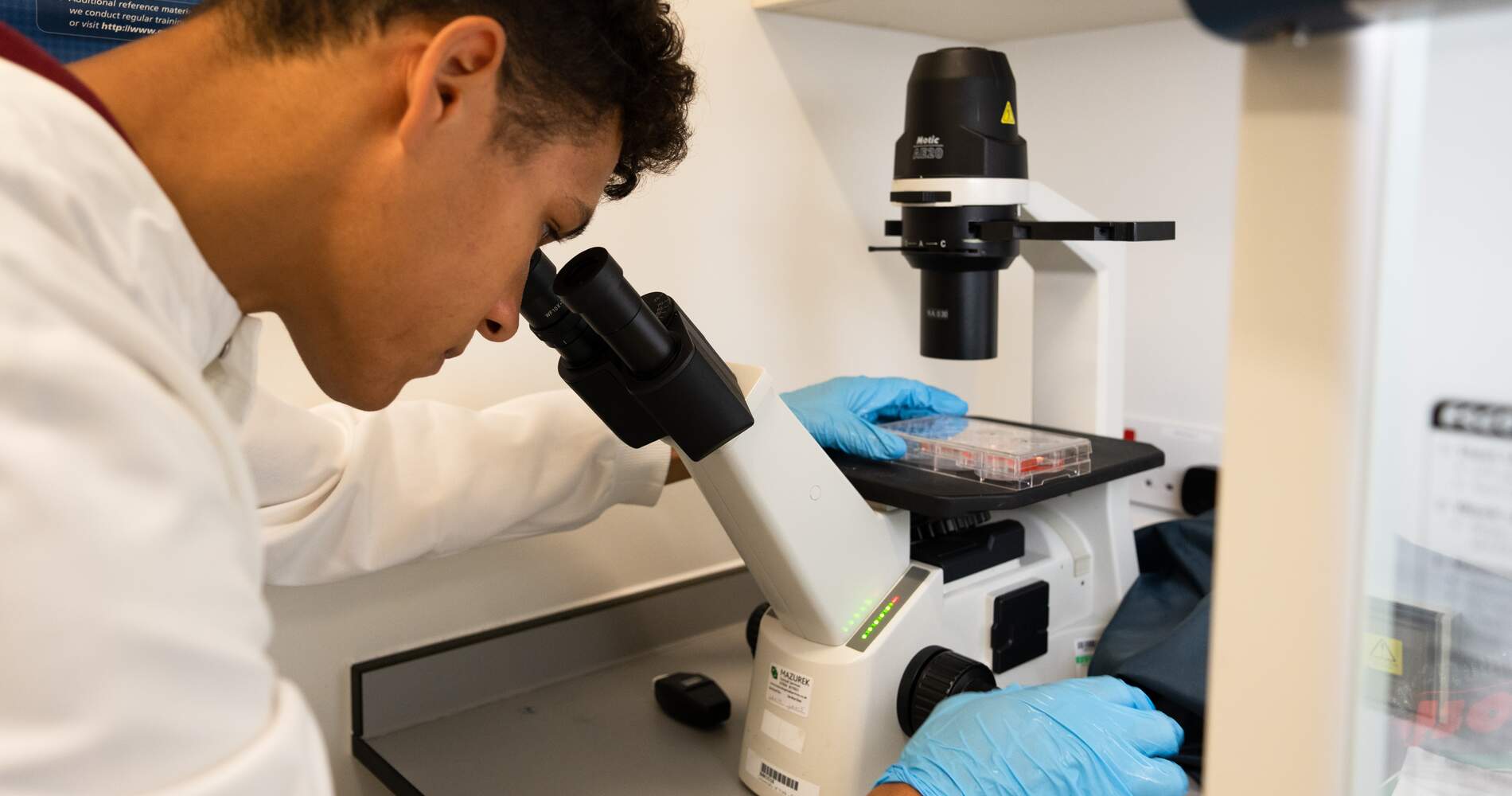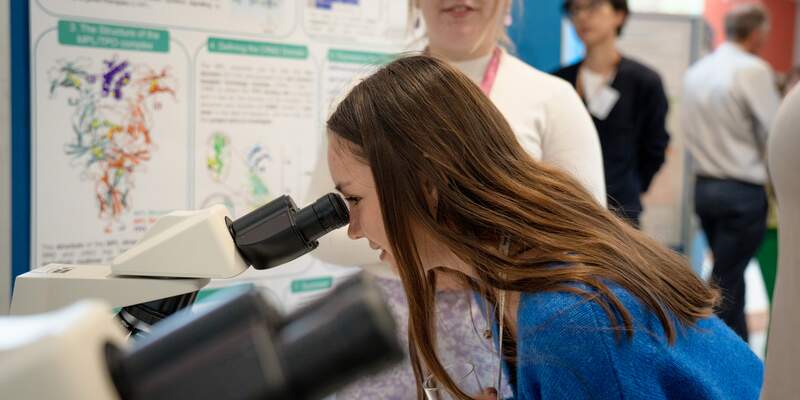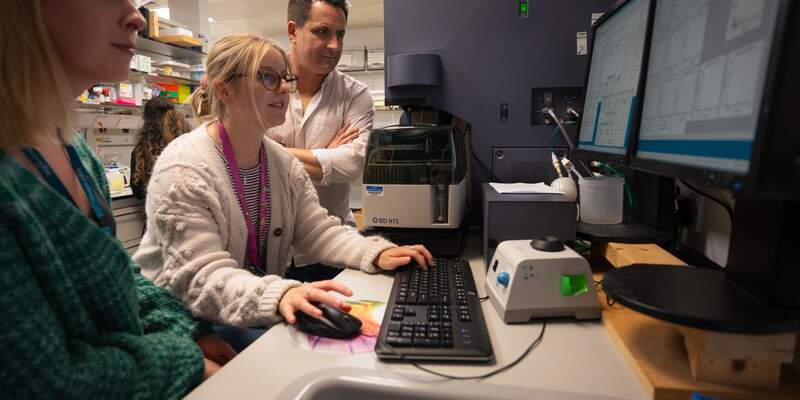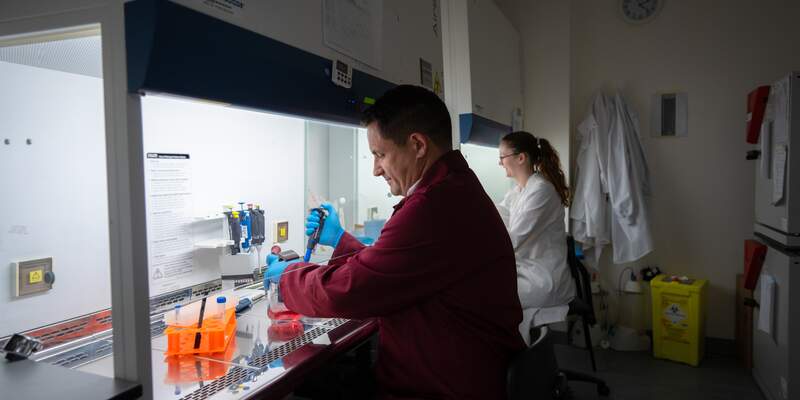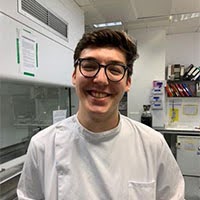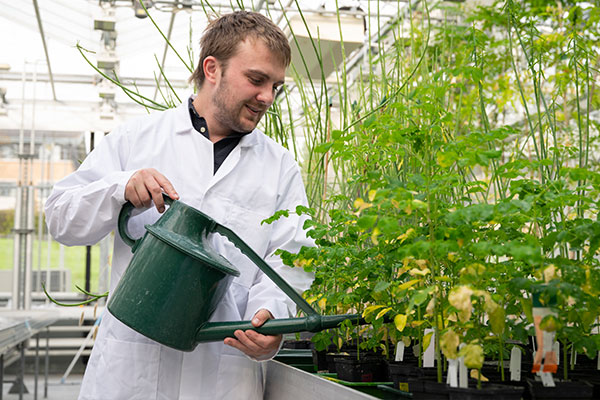| Prof Luke Alphey |
Biology |
Synthetic biology; genetics; vectors; arboviruses; translation |
| Prof Fred Antson |
Chemistry |
Protein-nucleic acid interactions |
| Prof Daniela Barillà |
Biology |
Genome segregation, antibiotic resistance, chromosome & plasmid biology, DNA-protein interactions |
| Dr Gavin Barlow |
HYMS |
Infection; Antibiotics; Antimicrobials; Biomarkers; Prognosis |
| Dr Christoph Baumann |
Biology |
A variety of cellular processes, including transcription, replication and recombination, involve simultaneous melting and unwinding of the two DNA strands, and translocation of the strands within a DNA-bound protein complex. |
| Dr Jamie Blaza |
Chemistry |
CryoEM; Electron-tomography; Bacteria; Bioenergetics; Pathogens |
| Dr Dave Boucher |
Biology |
Inflammasome and protease signalling |
| Dr Katherine Bridge |
Biology |
Understanding and targeting the hypoxic response in acute myeloid leukaemia (AML) |
| Dr Mathieu Cayla |
Biology |
Parasitology; Trypanosome; Signalling; Autophagy; Differentiation |
| Prof James Chong |
Biology |
Anaerobic applied systems biology |
| Dr Cecile Crosnier |
Biology |
Schistosoma; Recombinant proteins; Immunomodulation; Protein interactions; Parasitology |
| Dr Simon Crouch |
Health Sciences |
Biostatistics; Stochastic Modelling; Predictive Modelling; Big Data; Haematological Malignancies |
| Prof Anne-Kathrin Duhme-Klair |
Chemistry |
Metal ions in biology and medicine |
| Dr Joana R. Correia Faria |
Biology |
Gene expression; Nuclear-architecture; Microscopy; Proteomics; Next-generation-sequencing |
| Prof Adele Fielding |
HYMS |
Acute lymphoblastic leukaemia (ALL), microenvironment, cancer-associated fibroblasts, clinical trials, biobanking |
| Dr Paul Fogg |
Biology |
Horizontal Gene Transfer (HGT), which is a fundamental and powerful process for the exchange of genes between bacteria. |
| Prof Allison Green |
HYMS |
Autoimmunity; Type 1 diabetes; Thymic B cells; Immune system ageing; Preclinical and clinical models of disease |
| Dr William Grey |
Biology |
Stem Cells; Proteostasis; Haematopoiesis; Leukaemia; Cancer |
| Dr Michelle Hawkins |
Biology |
Bacteria; DNA replication; Helicases; Replication termination; Biochemistry |
| Dr James Hewitson |
Biology |
Mammalian immune responses to parasitic worm infections. |
| Dr Chris Hill |
Biology |
Structural biology; RNA biology; Viruses; Gene expression; Translational control |
| Prof Ian Hitchcock |
Biology |
My group have identified a key interaction between a cell surface receptor and a mutated protein that is essential for myeloproliferative neoplasms (MPN) development. |
| Dr Daniel Jeffares |
Biology |
Population and comparative genomics. Incuding quantative genetics, landscape genetics and the evolution of drug resistance. |
| Prof Steven Johnson |
School of Physics, Engineering & Technology |
Biosensors, Infection, Electrochemistry, Microfluidics, Co-design. |
| Prof Paul Kaye |
HYMS |
The immunopathology of leishmaniasis, with emphasis both on exploring opportunities for developing novel host-directed therapies and also for gaining new insight into myeloid cell function. |
| Prof David Kent |
Biology |
The biology of adult blood stem cells and the process by which single blood stem cells are subverted to drive blood cancers such as leukaemia. |
| Dr Ioannis Kourtzelis |
HYMS |
The study of mechanisms that orchestrate the onset and resolution of sterile and pathogen-induced inflammation. |
| Prof Thomas Krauss |
School of Physics, Engineering & Technology |
Photonic nanostructures; Optical biosensors; Antimicrobial susceptibility test; Nanofabrication technology |
| Prof Dimitris Lagos |
HYMS |
The overarching working hypothesis of our work is that modulation of immune responses is a key function of non-coding RNAs in mammals and that coordination of the machineries that control non-coding and coding RNA metabolism is required for optimal mammalian immunity. |
| Prof Alison Layton |
HYMS |
Acne; Scarring; Clinical Trials; Antimicrobial resistance; Psycho-dermatology |
| Prof Mark Leake |
Biology & School of Physics, Engineering & Technology |
Biophysics; Single-molecule; Bioimaging; Super-resolution; Single-cell |
| Dr Amanda Mason-Jones |
Health Sciences |
Sexually transmitted infections; Epidemiology; Violence; Public health prevention; Children and young people. |
| Dr Sean Meaden |
Biology |
Phage-bacteria interactions; phage defence systems; metagenomics; soil microbiome; microbial ecology. |
| Prof Jeremy Mottram |
Biology |
Molecular genetics, cell biology and biochemistry of Leishmania, the parasitic protozoan that causes the neglected tropical disease leishmaniasis |
| Dr Elmarie Myburgh |
HYMS |
My research focusses on the complex interplay between pathogens and their hosts, with a particular interest in the kinetoplastids Leishmania and African trypanosomes. |
| Prof Rob Newton |
Health Sciences |
Cancer; Infections; Africa; HIV; Immunity |
| Dr Samadhan Patil |
School of Physics, Engineering & Technology |
Point-of-care diagnostics; Bio-sensors; Metabolomics; Antimicrobial resistance; Bio-mechanics |
| Dr Damian Perez Mazliah |
HYMS |
B cells; Antibodies; Parasites; Chagas disease; Trypanosoma |
| Dr Michael Plevin |
Biology |
Biomolecular recognition and the structural and chemical features that define interaction surfaces of proteins and nucleic acids. |
| Dr Natalie Prow |
HYMS |
Vaccinology; Skin delivery; Immunogenicity; Efficacy |
| Dr Kim Robinson |
HYMS |
Innate immunity; Skin biology; inflammatory skin disease; Inflammasome; 3D skin organotypics |
| Prof Eve Roman |
Health Sciences |
Haematological malignancies; Childhood cancers; Epidemiological methods; Adverse reproductive events |
| Dr Nathalie Signoret |
HYMS |
Chemokines and their receptors have emerged as essential controls for the trafficking and activation of immune cells, in both homeostatic and inflammatory conditions. Our research aims to define how these molecules influence immune responses and establish the mechanisms by which they exert their activity. |
| Prof Alex Smith |
Health Sciences |
Epidemiology; Leukaemia; Lymphoma; Myeloma |
| Prof Gavin Thomas |
Biology |
The Thomas group has two main interests that are linked by the bacterium Escherichia coli. We are interested in the mechanisms used by different bacteria, mainly huma |
| Prof Reidun Twarock |
Biology & Maths |
The structure and assembly of viruses. Viruses have a protein shell that encapsulates and hence provides protection for the viral genome. |
| Dr Katrien van Boxclaer |
HYMS |
Skin drug delivery; topical formulation development; skin models; cutaneous leishmaniasis |
| Prof Marjan Van der Woude |
HYMS |
Current projects are centred around molecular biology of bacterial pathogens. One centres around AT3 proteins, and work to elucidate specific molecular pathways involved in biofilm formation in Staph aureus (Pearson C et al, Newman K et al). A project to link to our Bottery et al publication can be discussed. |
| Dr Pegine Walrad |
Biology |
Kinetoplastid parasites which cause human disease worldwide; afflicting the poorest of society. |
| Prof James Walsh |
School of Physics, Engineering & Technology |
Biofilms; reactive oxygen species; cold plasma; antimicrobial resistance; decontamination |
| Prof Tony Wilkinson |
Chemistry |
Structure function analysis of proteins relevant to (i) disease processes and drug discovery in parasites and (ii) cell fate and virulence in spore-forming bacteria |
| Dr Laurence Wilson |
School of Physics, Engineering & Technology |
Imaging; Bioinformatics; Parasitology; Biological physics; Motility |
| Prof Gavin Wright |
Biology & HYMS |
The Wright Laboratory is interested in identifying new therapeutic targets for both genetic and infectious diseases by using systematic large-scale protein-based approaches to discover extracellular receptor-ligand interactions that are essential for cellular recognition processes. |
| Dr Miko Yamada |
HYMS |
Molecular pathology in skin; clinical trial; transdermal delivery; imaging; Biomarker discovery in skin diseases |

